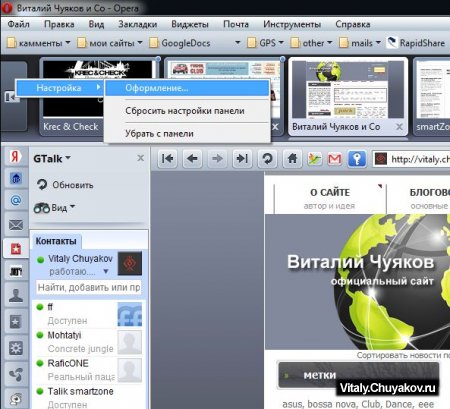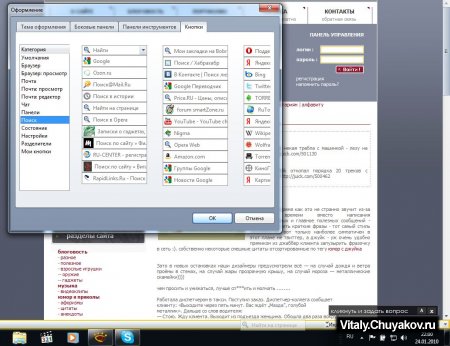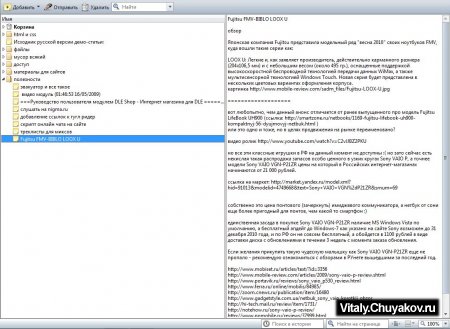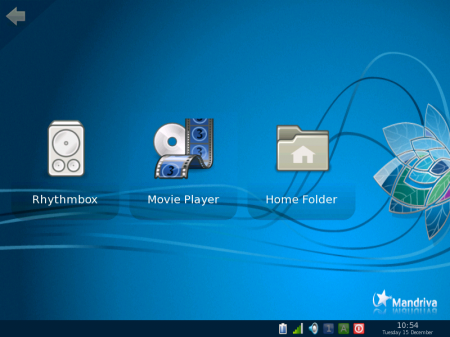Quick Search toolbar in Opera web browser

We continue to study the useful properties of the Opera Internet browser, earlier in the Quick Search article on any website using the Opera browser, I described how to configure search forms from various sites for your convenience, but now let's move on to the next level :)
We will take out the quick search boxes on the browser panel, for example, in the lower frame of the Opera, from the left corner are the Opera Link indicators, Unit and Opera Turbo mode

in the right corner of the page scale, the button for quickly turning on or off the display of pictures on the page, as well as a great button that allows you to use one of Opera’s oldest pieces — align the page to the screen width (i.e., if your screen, for example, is 800 pixels wide , and the site is sharpened to a width of 1024 pixels, after clicking on the special button, the site will fit into your 800 pixels :))

and the rest of the place we have is empty ... however disorder :)
that's where we put our custom panels with the necessary searches.
')
For me, the most useful forms of search are “search on page”, advanced computer users usually use the keyboard shortcut Ctrl + F, but not all are so smart, and for some reason ordinary users prefer not to use the keyboard again, but with a large amount of text on the page Search on this very page is a very necessary feature, which greatly facilitates the work with text.
The second mandatory search panel I recommend to put " Search in history "

Opera’s developers did not just mention advanced work with the history of visited pages, not only the website address, but also the page title and even the text from this page (although the amount of this text remains a mystery for me at the moment)
How to add these panels?
If you firmly remember that in Opera, almost all elements of browser interaction with the user are designed for consistency and, more importantly, for ease of use, you yourself will get to drag-and-drop panelek :)
for those who are already stiffened in their computer habits, I list the points.

1. Right-click on the panel in Opera (for example, I clicked the “sidebar” folding button)
Setup - Appearance ...

2. The Appearance window opens.
select the buttons tab
Next in the list of categories, select Search


3. Just grab the desired search box with the mouse and drag it to any operatic panel suitable for this purpose (such panels are usually highlighted with a golden frame).
After that we close the window “design” and begin to use new quick search windows.
Actually on this setting buttons for the opera panels can be considered over.
I want to remind once again Opera web browser is a product for blondes!
Those who for some reason saw in this text a negative shade can relax :) - in this case, the phrase “product for blondes” is the best praise, because the easier it is to master a technological product - the more pleasant it is in everyday use, although going back to blondes ...
someone very authoritative once said:
Blondes are not stupid, they just have other life priorities.
The same thing in Opera browser - why plugins? Opera has other priorities
and here everyone let him think out for himself ...
I partially found this confirmation for myself.
Distinctive operatic feature appeared in Opera 9 - Speed Dial Quick Launch
as far as I understand this feature is now implemented in the same way in Ognelis and even Google Chrome
Visual tabs - so far only in Opera, but something prompts me soon will be the same nyashki and other web browsers.
For example, on widescreen screens, visual tabs look great when they are displayed on the right or left side of the browser.

Custom search and search forms themselves customizable.
Built-in mail client - duplicate and even superior to the search part of Gmail
Well, the Notes panel - most never understood why it should be changed, except for the most obvious possibility to stupidly save text from the browser, and then read the saved note from a mobile phone via OperaMini.
I myself found another application of this browser function.

The notes section, especially if it is expanded to the full screen of the browser, and not left as a sidebar as it is done by default, becomes a very good text editor with useful functionality in the form of synchronization between computers using OperaSync as well as spell checking.
In addition, there is an instant search for the entire database of Notes.
It seems all this is nothing and the majority and the gift is not necessary, but there will definitely be users about the valuable features of the feature ...
For example, I would like to see Opera functionality in Linux InstantOn systems, now they have literally implemented several items that are considered most important for Internet-small to launch a browser, Skype, chat, write text, have a look at the video and even listen to music ... everything seems to be indicated.

And if instead of the Linux version of Ognelis, there would be Opera 10?
One browser would immediately replace the mail client with an RSS reader and a text editor (notes) and a torrent rocking chair (unless of course someone in their right mind would launch a torrent from InstantOn OS) and that the most correct thing in such systems is all the bookmarks, history and Notes would be synchronized with a full-fledged OS that would be launched on the occasion, when the resources of “fast as-is-OSes” are clearly not enough.
At the moment, I don’t know the implementations of InstantOn OS based on Opera , but I hope that someone will try to do it and then (I’ll say the most terrible), it’s possible that the Google axis isn’t really in the cash register :)
I intentionally did not mention anything about opera widgets and Unit applications - I will leave it for a separate material.
Source: https://habr.com/ru/post/81871/
All Articles